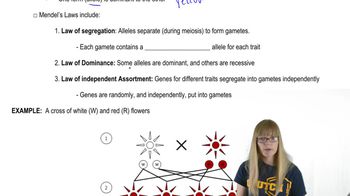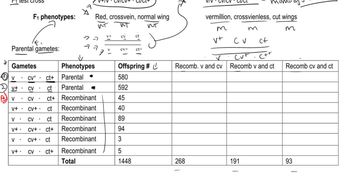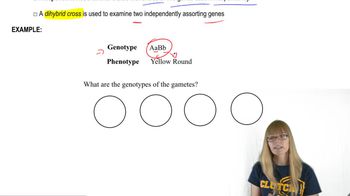Table of contents
- 1. Introduction to Genetics51m
- 2. Mendel's Laws of Inheritance3h 37m
- 3. Extensions to Mendelian Inheritance2h 41m
- 4. Genetic Mapping and Linkage2h 28m
- 5. Genetics of Bacteria and Viruses1h 21m
- 6. Chromosomal Variation1h 48m
- 7. DNA and Chromosome Structure56m
- 8. DNA Replication1h 10m
- 9. Mitosis and Meiosis1h 34m
- 10. Transcription1h 0m
- 11. Translation58m
- 12. Gene Regulation in Prokaryotes1h 19m
- 13. Gene Regulation in Eukaryotes44m
- 14. Genetic Control of Development44m
- 15. Genomes and Genomics1h 50m
- 16. Transposable Elements47m
- 17. Mutation, Repair, and Recombination1h 6m
- 18. Molecular Genetic Tools19m
- 19. Cancer Genetics29m
- 20. Quantitative Genetics1h 26m
- 21. Population Genetics50m
- 22. Evolutionary Genetics29m
4. Genetic Mapping and Linkage
Trihybrid Cross
Problem 8d
Textbook Question
Determine whether the statements below are true or false. If a statement is false, provide the correct information or revise the statement to make it correct.
The outcome of a trihybrid cross is predicted by the law of segregation.
 Verified step by step guidance
Verified step by step guidance1
Understand the law of segregation: This law states that during gamete formation, the two alleles for each gene separate so that each gamete carries only one allele for each gene. It applies to the inheritance of a single gene.
Recognize that a trihybrid cross involves three genes, each with two alleles. While the law of segregation applies to each individual gene, it does not predict the overall outcome of a trihybrid cross.
Identify the correct principle for predicting the outcome of a trihybrid cross: The law of independent assortment is the key principle here. It states that alleles of different genes assort independently during gamete formation, provided the genes are on different chromosomes or far apart on the same chromosome.
Revise the statement: The outcome of a trihybrid cross is predicted by the law of independent assortment, not solely by the law of segregation.
Conclude that the statement is false and provide the corrected version: 'The outcome of a trihybrid cross is predicted by the law of independent assortment, which works in conjunction with the law of segregation for each gene.'
 Verified video answer for a similar problem:
Verified video answer for a similar problem:This video solution was recommended by our tutors as helpful for the problem above
Video duration:
2mPlay a video:
Was this helpful?
Key Concepts
Here are the essential concepts you must grasp in order to answer the question correctly.
Law of Segregation
The Law of Segregation, proposed by Gregor Mendel, states that during the formation of gametes, the two alleles for a trait separate, so that each gamete carries only one allele for each gene. This principle is fundamental in understanding how traits are inherited and is crucial for predicting the outcomes of genetic crosses.
Recommended video:
Guided course

Mendel's Laws
Trihybrid Cross
A trihybrid cross involves the genetic crossing of organisms that differ in three traits, each controlled by different genes. This type of cross allows for the examination of the inheritance patterns of multiple traits simultaneously, and the expected phenotypic ratio from a trihybrid cross is typically 27:9:9:9:3:3:1, assuming independent assortment.
Recommended video:
Guided course

Trihybrid Cross
Law of Independent Assortment
The Law of Independent Assortment states that alleles for different traits segregate independently of one another during gamete formation. This principle is essential for understanding the outcomes of dihybrid and trihybrid crosses, as it allows for the combination of traits in offspring that are not influenced by the inheritance of other traits.
Recommended video:
Guided course

Gamete Genetics and Independent Assortment
Related Videos
Related Practice
Multiple Choice
Suppose a geneticist is using a three-point testcross to determine the order of three linked genes on a chromosome. Which of the following outcomes would provide the most information about gene order?
13
views


